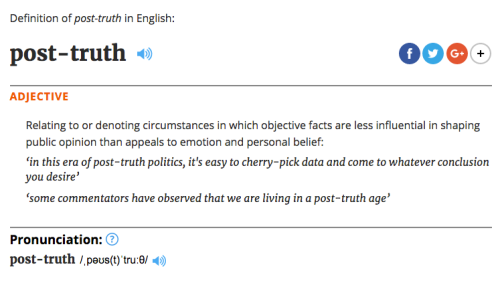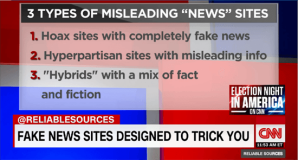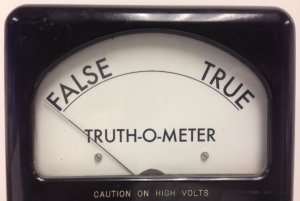Politico, a left-leaning web magazine, just published an essay about the bubble in which journalists live. According to the authors the bubble is not just geographic, but also ideological. According to Politico, the media bubble served to insulate journalists from the people and issues that ultimately led to the election of Donald Trump. For most journalists it was not an issue of whether Hillary Clinton would win, but by how great a margin. Was it perhaps because they didn’t understand what was happening across the country? According to Politico,
Nearly 90 percent of all internet publishing employees work in a county where Clinton won, and 75 percent of them work in a county that she won by more than 30 percentage points.
Another essay, this one by pollster and statistician Nate Silver, (the golden boy of recent electoral race coverage), makes the argument that the national media were the victims of group think leading up to the 2016 Presidential election. Silver’s essay spends some time reviewing a premise introduced by James Surowiecki in his book The Wisdom of Crowds. Surowiecki’s thesis is that networking theory, applied to information flow, can yield superior results given certain conditions. Whether the crowd is professional journalists or citizen journalists, the idea is that collective wisdom is superior to the wisdom of any one member of the group. That is fine if the conditions are met. If not, group-think, an idea popularized in the 1970s by Irving Janis, leads to poor judgement and low-quality decision-making. According to Janis,
the more amiability and esprit de corps there is among the members of a policy-making ingroup, the greater the danger that independent critical thinking will be replaced by groupthink, which is likely to result in irrational and dehumanizing actions directed against outgroups. (https://web.archive.org/web/20100401033524/http://apps.olin.wustl.edu/faculty/macdonald/GroupThink.pdf)
Both articles point to a serious problem for national media coverage of politics. More than ever, national journalists are more highly educated, more liberal, less religious, richer, younger, more urban, and much more likely to live in communities with like-minded neighbors. The liberal, coastal, elite journalist is becoming the norm when it comes to national media coverage, and that is a problem for the future of the industry. Some have argued that this trend has led to an erosion of trust and created a credibility vacuum where fake news and lies can thrive.
This was not always the case. Journalists have not always been so out of touch with the audience that they serve. The failure of local and regional newspapers is a significant contributing factor. According to Politico, labor statistics are a clear indication of the trend.
In late 2015, during Barack Obama’s second term, these two trend lines—jobs in newspapers, and jobs in internet publishing—finally crossed. For the first time, the number of workers in internet publishing exceeded the number of their newspaper brethren. Internet publishers are now adding workers at nearly twice the rate newspaper publishers are losing them.
As news shifts from local newspapers and local reporters who reflected their communities’ values, to national news organizations located in major metropolitan centers on the coasts, it has becoming increasingly likely that the news that we’re consuming on social media and television is out of touch with mainstream values and main street sensibilities.
Another theory that may be useful to understand what is happening is Elisabeth Noelle-Neumann’s Spiral of Silence theory. According to this theory, unpopular ideas are pushed to the margins, where they slowly lose favor and spiral downward to eventual silence. We’re fine with this if it’s a bad idea, one that does not deserve to be sustained. But what about when an unpopular idea is silenced because those in authority don’t want to give it a hearing? What about unpopular ideas that are banished to the margins because groupthink has created a hostile climate for those kinds of ideas? What if the lack of ideological diversity in our newsrooms creates an echo chamber that drowns out dissenting voices?
Conservatives have consistently accused the national media of having a liberal bias, and that appears to be supported by these essays. But I’ll close with this quote from the Politico article…
Resist—if you can—the conservative reflex to absorb this data and conclude that the media deliberately twists the news in favor of Democrats. Instead, take it the way a social scientist would take it: The people who report, edit, produce and publish news can’t help being affected—deeply affected—by the environment around them. Former New York Times public editor Daniel Okrent got at this when he analyzed the decidedly liberal bent of his newspaper’s staff in a 2004 column that rewards rereading today. The “heart, mind, and habits” of the Times, he wrote, cannot be divorced from the ethos of the cosmopolitan city where it is produced. On such subjects as abortion, gay rights, gun control and environmental regulation, the Times’ news reporting is a pretty good reflection of its region’s dominant predisposition. And yes, a Times-ian ethos flourishes in all of internet publishing’s major cities—Los Angeles, New York, Boston, Seattle, San Francisco and Washington. The Times thinks of itself as a centrist national newspaper, but it’s more accurate to say its politics are perfectly centered on the slices of America that look and think the most like Manhattan.
Something akin to the Times ethos thrives in most major national newsrooms found on the Clinton coasts—CNN, CBS, the Washington Post, BuzzFeed, Politico and the rest. Their reporters, an admirable lot, can parachute into Appalachia or the rural Midwest on a monthly basis and still not shake their provincial sensibilities: Reporters tote their bubbles with them.



 The tragic roster of journalists who have disgraced their profession gained a new member last week when Juan Thompson, a reporter for the Intercept, was arrested on a number of serious charges. Those charges include “making more than a half-dozen bomb threats against Jewish community centers, schools and a Jewish history museum” as reported in the
The tragic roster of journalists who have disgraced their profession gained a new member last week when Juan Thompson, a reporter for the Intercept, was arrested on a number of serious charges. Those charges include “making more than a half-dozen bomb threats against Jewish community centers, schools and a Jewish history museum” as reported in the  You may have seen the eruption on Twitter from various “alternative” governmental organizations after
You may have seen the eruption on Twitter from various “alternative” governmental organizations after 
 There’s been a lot of discussion lately about the potential danger of fake news. Apparently we’re a lot more gullible and susceptible to misinformation than anyone imagined, and IT IS KILLING DEMOCRACY! Okay, that conclusion may be overstating it a bit, but the number of media and political analysts who are wringing their hands over the outcome of the recent election seems to be growing. And seeking an explanation (or scapegoat), some are pointing the finger at fake news.
There’s been a lot of discussion lately about the potential danger of fake news. Apparently we’re a lot more gullible and susceptible to misinformation than anyone imagined, and IT IS KILLING DEMOCRACY! Okay, that conclusion may be overstating it a bit, but the number of media and political analysts who are wringing their hands over the outcome of the recent election seems to be growing. And seeking an explanation (or scapegoat), some are pointing the finger at fake news. Mass media are essential to the process of democracy. “Government of the people, by the people, for the people” only works if the people know what’s going on…and the media provide the primary channels for that information. Of course the implication is that the mass media do their jobs in a responsible way, avoiding partisan bias and manipulation by outside interests. The brunt of this responsibility falls on journalists. Whether they work for newspapers, TV networks, or internet websites, reporters who cover the political beat are the eyes and ears of the American electorate. Ideally they report what they see and hear without speculation or conjecture.
Mass media are essential to the process of democracy. “Government of the people, by the people, for the people” only works if the people know what’s going on…and the media provide the primary channels for that information. Of course the implication is that the mass media do their jobs in a responsible way, avoiding partisan bias and manipulation by outside interests. The brunt of this responsibility falls on journalists. Whether they work for newspapers, TV networks, or internet websites, reporters who cover the political beat are the eyes and ears of the American electorate. Ideally they report what they see and hear without speculation or conjecture.